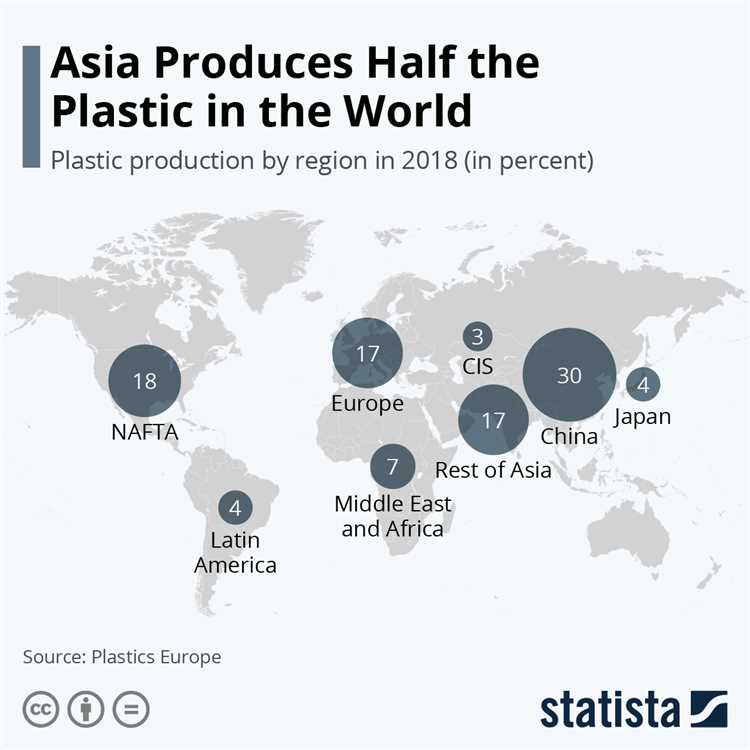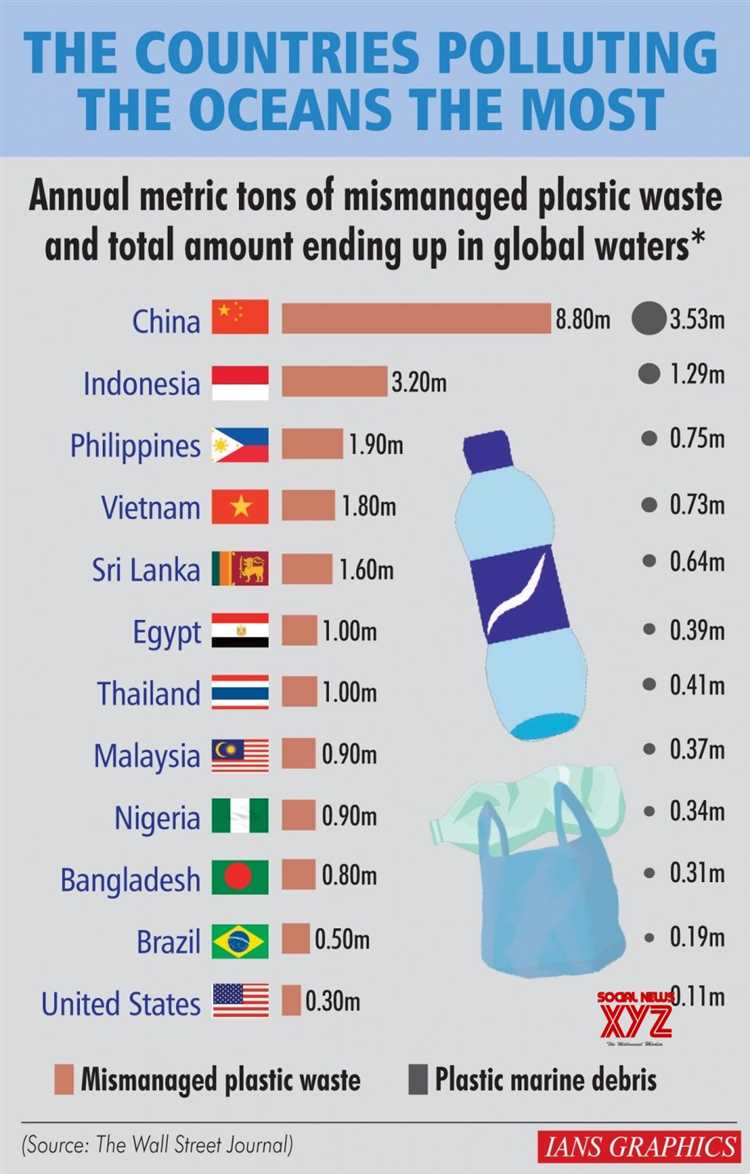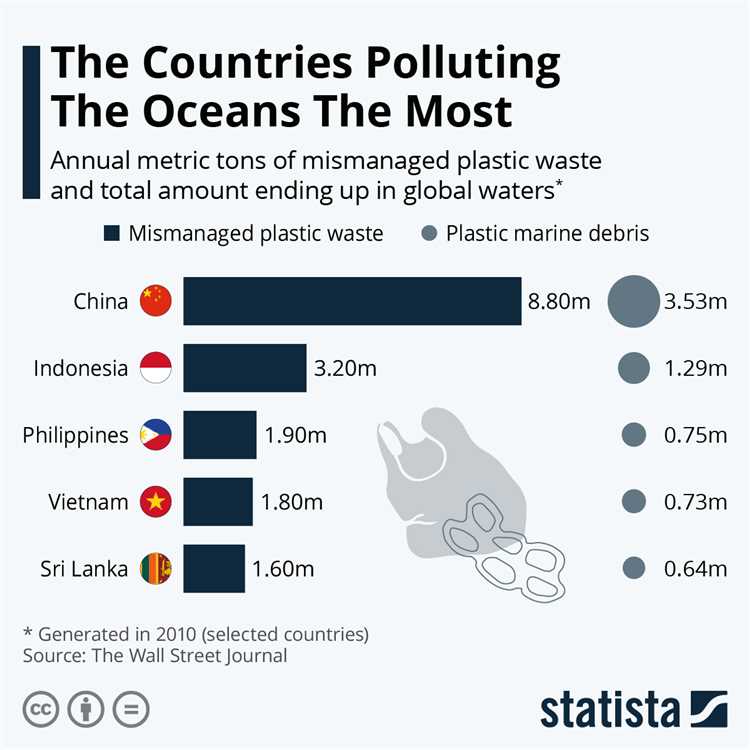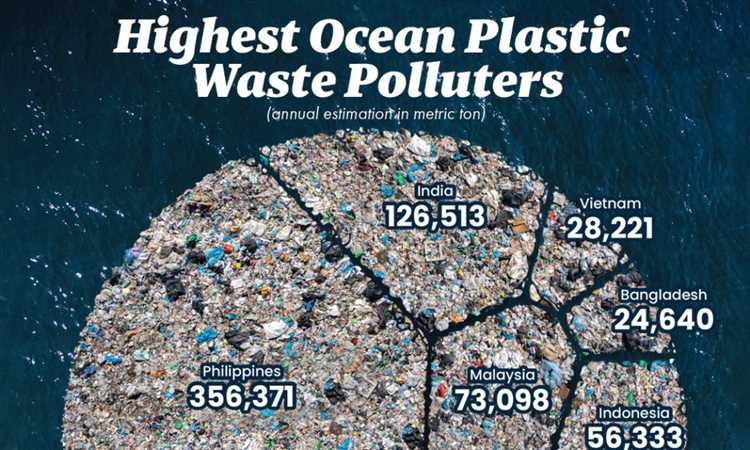
Ocean pollution is a pressing global issue that poses a threat to marine life and ecosystems. It is caused by a variety of factors, including industrial waste, sewage, and plastic debris. However, certain countries are more responsible for this pollution than others. In this article, we will explore the country ranking of ocean polluters to identify the biggest culprits.
First on the list is China, known for its massive industrial sector and population. With its rapid economic growth and large population, China produces a significant amount of waste that ends up in the ocean. Industrial discharge and untreated sewage are major contributors to China’s ocean pollution problem. Despite efforts to reduce pollution, China continues to be a leading polluter.
Following closely behind is Indonesia, a country with a vast archipelago and numerous coastal communities. Indonesia faces challenges in waste management and lacks effective infrastructure for proper waste disposal. As a result, a substantial amount of plastic waste ends up in the ocean, threatening marine life and ecosystems. The government has implemented various initiatives to combat ocean pollution, but more needs to be done.
Another major contributor to ocean pollution is the United States. With its highly industrialized economy, the US produces massive amounts of waste and has insufficient recycling infrastructure. Plastic waste, in particular, poses a significant problem as it takes a long time to decompose and can harm marine life. Efforts are being made to reduce plastic consumption and improve waste management, but a collective, global approach is needed to combat this issue.
In conclusion, ocean pollution is a global problem that requires the participation of all countries to find a solution. While China, Indonesia, and the United States top the list of ocean polluters, it is crucial for every nation to take responsibility and work together to reduce pollution and protect our oceans for future generations.
- Overview of Ocean Pollution
- The Impact of Ocean Pollution on Marine Life
- Factors Considered in the Ranking
- The Top Ocean Polluting Countries
- Efforts to Address Ocean Pollution
- 1. Legislation
- 2. Technological advancements
- Question-answer:
- Which country is the biggest ocean polluter?
- What are the main sources of ocean pollution?
- How does ocean pollution affect marine life?
- What measures are being taken to reduce ocean pollution?
- What can individuals do to help combat ocean pollution?
Overview of Ocean Pollution

Ocean pollution is a global environmental issue that refers to the presence of harmful substances and pollutants in the Earth’s oceans. It has become a significant concern as it poses serious threats to marine life, ecosystems, and even human health.
The sources of ocean pollution are varied and include both direct and indirect human activities. Some of the major sources of pollution include:
- Industrial waste: Industrial activities, such as manufacturing and mining, release a significant amount of toxic chemicals and heavy metals into the oceans.
- Plastic pollution: Plastic waste, including single-use plastics and microplastics, is one of the most prevalent and damaging forms of pollution in the oceans. It harms marine animals through ingestion and entanglement.
- Oil spills: Accidental or intentional oil spills from offshore drilling, shipping accidents, or tanker leaks contaminate the ocean water, leading to devastating consequences for marine life and coastal ecosystems.
- Agricultural runoff: The use of pesticides and fertilizers in agriculture can result in the runoff of chemicals into rivers and eventually into the oceans, causing eutrophication, harmful algal blooms, and oxygen depletion.
- Sewage and sewage sludge: Improper disposal of sewage and sewage sludge can introduce harmful pathogens, chemicals, and nutrients into the oceans, leading to water contamination and the proliferation of harmful algal blooms.
The impacts of ocean pollution are far-reaching. It harms marine ecosystems by disrupting food chains, destroying habitats, and causing the decline of various species. Additionally, pollution in the oceans can contaminate the seafood that humans consume, posing risks to human health.
Efforts to mitigate ocean pollution are crucial to protect the marine environment and ensure the sustainability of our oceans. International agreements and regulations, such as the MARPOL Convention and the Paris Agreement, aim to address pollution issues and promote sustainable practices. However, individual actions, such as reducing plastic consumption, properly disposing of waste, and supporting initiatives for clean oceans, are also essential in combating ocean pollution.
The Impact of Ocean Pollution on Marine Life
Ocean pollution has a significant impact on marine life and ecosystems. It poses a serious threat to the health and survival of various marine organisms, including fish, mammals, and corals. The pollution can come from various sources, such as industrial activities, agriculture, and waste dumping.
One of the major consequences of ocean pollution is the destruction of habitats. When pollutants like oil, chemicals, and plastics enter the water, they can contaminate the areas where marine organisms live and reproduce. This can lead to the degradation and loss of essential habitats like coral reefs, seagrass beds, and mangroves.
Marine life also suffers from pollution through ingestion and entanglement. Many species mistake plastic debris for food and end up consuming it. This can block their digestive systems, cause internal injuries, and even lead to their death. Sea turtles, for example, often mistake plastic bags for jellyfish, one of their main food sources.
In addition, marine animals like dolphins, whales, and seals can become entangled in fishing nets, lines, and other debris. This can restrict their movements, cause injuries, and prevent them from hunting and feeding properly. Many sea creatures die each year from suffocation or starvation due to entanglement.
Ocean pollution also affects the reproductive capabilities of marine organisms. Certain chemicals, such as heavy metals and pesticides, can disrupt the hormonal balance of marine animals, affecting their ability to reproduce. This can result in a decline in population numbers and a loss of genetic diversity, which are crucial for the survival of species.
The overall health of marine ecosystems is also at risk due to ocean pollution. When pollutants enter the water, they can cause eutrophication, which leads to excessive growth of algae. This depletes oxygen levels in the water, creating dead zones where marine life cannot survive. The loss of biodiversity in these areas disrupts the food chain and can have cascading effects on the entire ecosystem.
It is clear that ocean pollution has devastating effects on marine life. As responsible global citizens, it is essential to take action to reduce pollution and protect our oceans. This includes promoting sustainable practices, reducing plastic waste, implementing stricter regulations on industrial discharges, and supporting initiatives that aim to clean up and restore affected areas.
Factors Considered in the Ranking
Several factors were taken into consideration when ranking countries based on their ocean pollution. These factors provide a comprehensive view of a country’s impact on the health and cleanliness of the world’s oceans. The main factors considered include:
- Plastic waste production: The amount of plastic waste produced by a country is a significant factor in determining its ranking. This includes both the total amount of plastic waste generated and the per capita production rate.
- Waste management practices: The effectiveness of a country’s waste management practices, including recycling and waste disposal methods, plays a crucial role in determining its impact on the oceans.
- Marine conservation efforts: Countries that prioritize marine conservation and have established protected areas or marine sanctuaries are given higher rankings.
- Industrial pollution: The amount of industrial pollution, including chemical waste and heavy metals, discharged into the oceans by industrial activities is taken into consideration.
- Fishing practices: Countries with unsustainable and destructive fishing practices, such as overfishing and destructive fishing methods, are penalized in the ranking.
- Efforts to reduce pollution: Any efforts made by a country to reduce ocean pollution, including implementing stricter regulations and promoting sustainable practices, are considered in the ranking.
- International cooperation: Countries that actively participate in international efforts to combat ocean pollution, such as implementing international agreements and collaborating with other nations, are given higher rankings.
By considering these factors, the ranking provides a comprehensive assessment of a country’s contribution to ocean pollution and highlights areas where improvement is needed.
The Top Ocean Polluting Countries

As the problem of ocean pollution continues to escalate, it is important to examine which countries are the biggest contributors to this issue. The following are some of the top ocean polluting countries:
- China: China is consistently ranked as the largest ocean polluter in the world. With its massive population and booming industrial sectors, it is no surprise that China is responsible for a significant amount of marine pollution.
- Indonesia: Indonesia is another major offender when it comes to ocean pollution. Its coastal areas and rivers are often littered with plastic waste and other pollutants, which wash into the ocean and cause further damage.
- Philippines: The Philippines is known for its beautiful beaches and diverse marine life, but it is also a significant ocean polluter. Illegal dumping and poor waste management practices contribute to the pollution problem in the country.
- Vietnam: Vietnam’s rapid industrialization and population growth have resulted in increased pollution levels in its coastal areas. Plastic waste and other pollutants are frequently found in its rivers and ultimately end up in the ocean.
- Thailand: Thailand’s popular tourist destinations often suffer from high levels of ocean pollution. Tourist activities, as well as inadequate waste management systems, contribute to the problem.
These countries, along with many others, must take immediate and effective measures to address the issue of ocean pollution. It is essential to raise awareness, improve waste management practices, and implement stricter regulations to protect our oceans and marine ecosystems.
Efforts to Address Ocean Pollution
Ocean pollution is a global issue that requires efforts from all countries to address. Many countries are taking steps to reduce their contributions to ocean pollution and mitigate the impacts on marine ecosystems. These efforts involve a combination of legislation, technological advancements, education, and global cooperation.
1. Legislation
One of the key approaches to addressing ocean pollution is implementing legislation that regulates and controls pollution sources. Many countries have enacted laws and regulations to limit industrial effluents, sewage discharge, and illegal dumping. These laws also encourage the proper management and treatment of waste before it enters the ocean.
Some countries have also established marine protected areas (MPAs) to safeguard vulnerable marine ecosystems from pollution. MPAs restrict certain activities such as fishing, oil exploration, and waste disposal within their boundaries to maintain the health and biodiversity of the ocean.
2. Technological advancements

Advancements in technology play a significant role in addressing ocean pollution. Countries are investing in research and development to develop innovative solutions for marine pollution. For example, improved wastewater treatment systems are being developed to effectively treat sewage and remove harmful contaminants before they enter the ocean.
In addition, technological innovations are being made in the field of ocean cleanup. Various projects aim to remove floating debris, plastics, and other pollutants from the ocean using advanced cleanup systems. Such efforts not only target existing pollution but also aim to prevent further pollution with the deployment of litter traps and specialized filtration systems.
3. Education and Awareness
Education and awareness campaigns are crucial in changing public behavior and attitudes towards ocean pollution. Many countries are actively promoting environmental education in schools and communities to increase awareness about the negative impacts of pollution on marine ecosystems.
Through education, people are encouraged to adopt sustainable practices such as reducing single-use plastics, recycling, and properly disposing of waste. Additionally, awareness campaigns highlight the importance of preserving marine life and ecosystems, creating a sense of responsibility among individuals and communities to take action against ocean pollution.
In conclusion, addressing ocean pollution requires a collective effort from countries around the world. Legislation, technological advancements, and education play vital roles in tackling this global issue. By implementing effective measures and promoting responsible practices, we can protect our oceans and ensure a sustainable future for marine ecosystems.
Question-answer:
Which country is the biggest ocean polluter?
The biggest ocean polluter is China. It is responsible for approximately 28% of global ocean pollution.
What are the main sources of ocean pollution?
The main sources of ocean pollution are plastic waste, industrial discharges, sewage, and oil spills.
How does ocean pollution affect marine life?
Ocean pollution has a detrimental effect on marine life. It can lead to the destruction of habitats, the decline of fish populations, and the endangerment of marine species.
What measures are being taken to reduce ocean pollution?
Several measures are being taken to reduce ocean pollution, including improving waste management systems, implementing stricter regulations on industrial discharges, promoting recycling, and raising awareness about the issue.
What can individuals do to help combat ocean pollution?
Individuals can help combat ocean pollution by reducing their use of single-use plastic, properly disposing of waste, participating in beach clean-ups, and supporting organizations and initiatives that are working to protect the oceans.